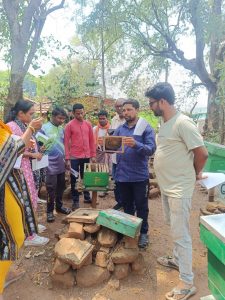Thai Sacbrood Virus spread: Horticulture, agri officials inspect beehives in Koraput

Nandapur: A day after a report in this newspaper highlighted alarming death of honeybees due to the outbreak of Thai Sacbrood Virus (TSBV) in Koraput district, the district administration has launched a swift response to tackle the spread of the virus.
The report titled “Honeybees disappear from Plateau” appeared in April 13 edition of OrissaPOST, highlighting the growing presence of TSBV in honeybee colonies – whether kept in manmade hives or naturally found in tree hollows and rocky crevices. The bees are vanishing at an unprecedented rate due to spread of TSBV, a highly contagious viral disease.
Directed by Koraput Collector V Keerthi Vasan, horticulture and agriculture officers visited several villages, including Nandapur, Bisapur, Marada, Nalachua, Debagandhana, Banamaliput, Malipungar, and Kandhapungar villages to assess the condition of the infected beehives Sunday.
The Collector has reportedly informed state-level officials and OUAT authorities in Bhubaneswar about the concerns raised by the farmers. A delegation is expected to visit the district soon to inspect the infected bee boxes and discuss solutions with local beekeepers, he said.
The officials examined the affected hives, spoke to the affected farmers, and investigated the source of the disease and possible import of infected bees.
The team included Horticulture Officer M Suresh Pattnaik, Assistant Horticulture Officer Archana Priyadarshini, and Agriculture Officer Sabita Kuldeep, among others. They held consultations with several farmers and provided them with necessary guidance to contain the spread of the disease.
Further monitoring by state entomologists and the Collector is expected shortly.
The farmers also submitted a memorandum containing their three-point charter of demands to the visiting team, demanding immediate steps to prevent the spread of the infection.
In the memorandum, the farmers urged officials to ban the import of bees, bee boxes, and related equipment from coastal areas for the next three years in light of rising infections. They also called for restrictions on institutions that have distributed infected bees in the past.
PNN
News